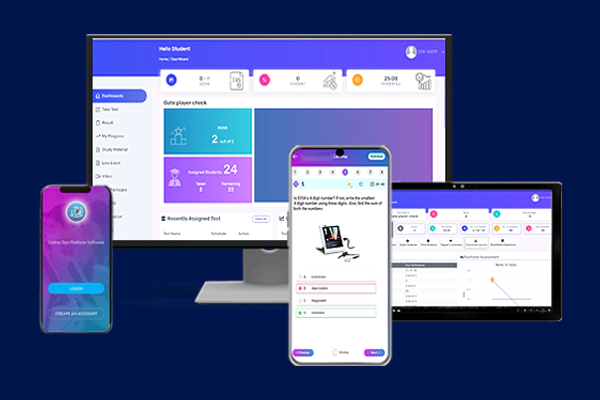Online Exam Portal
The world of education has undergone a significant transformation in recent years, with technology playing a pivotal role in reshaping the way we learn and assess knowledge. Online exam portals have emerged as a game-changer, offering both educational institutions and students a convenient, efficient, and secure way to conduct exams. In this blog, we will delve into the world of online exam portals, exploring their benefits, features, and their profound impact on the education landscape.
1. Accessibility and Convenience: Online exam portals offer students the flexibility to take exams from the comfort of their own homes, eliminating the need for physical exam centers. This level of accessibility is especially valuable for distance learning programs, working professionals, and individuals with diverse scheduling constraints.
2. Security and Anti-Cheating Measures: One of the primary concerns when it comes to online exams is maintaining academic integrity. Modern online exam portals employ various security measures, including biometric authentication, randomized question order, and AI-powered proctoring to deter and detect cheating. These systems have greatly reduced the likelihood of academic dishonesty.
3. Immediate Results: As online tests frequently yield results instantly, students can get
their scores and feedback right away. The learning process is improved by this rapid turnaround since it allows students to focus on areas that require improvement by identifying their strengths and limitations.

4. Environmentally Friendly: Online exams are an eco-friendly alternative to traditional paper-based exams, as they significantly reduce the consumption of paper and the carbon footprint associated with logistics.
5. Cost-Efficiency: Both educational institutions and students can benefit from cost savings with online exam portals. Educational institutions can reduce the administrative costs of exam logistics, while students save on transportation and accommodation expenses typically associated with in-person exams.
6. Adaptive Testing: Many online exam portals offer adaptive testing, where the difficulty of questions adjusts based on a student's performance. This ensures that each student is assessed fairly, with questions tailored to their level of knowledge.
7. Greater Reach: Online exam portals break down geographical barriers, enabling educational institutions to reach a broader audience. International students, in particular, can benefit from the convenience of taking exams online.
8. Enhanced Analytics: Online exam portals often include detailed analytics and reporting features. These insights help educators and institutions identify trends, assess question quality, and refine their curricula for better learning outcomes.
9. Customization: Online exam portals can be customized to suit the specific needs of educational institutions. This includes the ability to create a wide variety of question types, conduct surveys, and integrate with learning management systems.
10. Time and Resource Management: For educators, online exam portals streamline the process of exam creation, distribution, and grading. This frees up valuable time and resources for more effective teaching and educational activities.
In summary, the education industry has transformed thanks to online exam portals, which offer cost-effectiveness, accessibility, security, and convenience. It is anticipated that the online exam experience will advance in sophistication and usability as technology develops further. Both educational institutions and students may adjust to the evolving educational landscape by adopting this game-changing technology, guaranteeing that learning and assessment continue to be efficient, egalitarian, and accessible to all.



